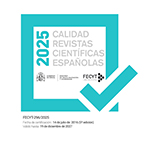Body and property in Hegel’s practical philosophy
Abstract
Based on Hegel's developments on the property right of the person over his body, this article tries to clarify certain limits for its exercise and hypothesize arguments to defend the subjective rights involving the body. First, the Hegelian concept of person is addressed. Self-reference of the self and intersubjective recognition are two key elements for its configuration. Second, the Hegelian approach to property rights is presented. It is explained (a) why private property is a necessary legal institution, (b) what relationship the person establishes with his body and (c) what are the limits on the exercise of property rights over the body. Finally, the Hegelian theses are examined, focusing on contemporary issues. The latter allows us to hypothesize arguments to support the rejection of the right to sell organs and the defense of the right to abortion and sex reassignment.
Downloads
Article download
License
In order to support the global exchange of knowledge, the journal Revista de Filosofía is allowing unrestricted access to its content as from its publication in this electronic edition, and as such it is an open-access journal. The originals published in this journal are the property of the Complutense University of Madrid and any reproduction thereof in full or in part must cite the source. All content is distributed under a Creative Commons Attribution 4.0 use and distribution licence (CC BY 4.0). This circumstance must be expressly stated in these terms where necessary. You can view the summary and the complete legal text of the licence.












